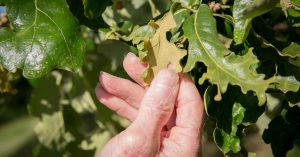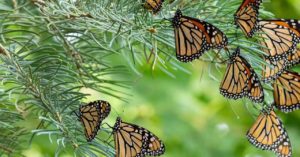If COVID-19 has taught us anything in 2020, it has shown us just how vulnerable our food system is to disruptions. We have taken for granted yeast, canned goods, fresh fruits and vegetables, but all are produced in a system that is not sustainable.
 Reporting on Damage
Reporting on Damage
In August, PRN, the National Wildlife Federation, and the Xerces Society published a report titled Drifting Toward Disaster: How Dicamba Herbicides are Harming Cultivated and Wild Landscapes. “In Illinois we’ve seen firsthand the effect that herbicide drift has on public and private lands, wildlife habitat, and farms that grow sensitive crops,” said Kim Erndt-Pitcher, PRN Habitat and Agriculture Programs Specialist. “The EPA seems more concerned with the needs of industry and manufacturers than those of farmers and the environment.”
We also released the 2018-2019 Tree and Plant Health Monitoring Report, the findings of which came from the hundreds of hours PRN members and partners such as Mary Kemper, Lou Nelms, and Seth Swoboda volunteered. The report revealed that symptoms of off-target herbicide injury were frequent, widespread, and present in a wide variety of plant types in the regions that were monitored.

PRN was active on the ground with farmers in southern Illinois. With the plants we grew from our seed collecting efforts, we helped create three “pollination stations” or pollinator gardens on local farms. We also maintained pollinator plant seed plots on farms across the state.
Working with Partners
We provided input along with our partners on Illinois’ Soil Health Strategy. This is a nationwide effort by the Natural Resources Conservation Service to include soil health as a goal of their programs and policies.
We continue to work with our partners in Regenerate IL, a statewide network with a mission to cultivate an equitable food system. Together we are connecting all groups and individuals working to create a food and farming system for Illinois that is just, fair, and based on regenerative agriculture.
Our work with farmers is also drawing connections to the ways they are fighting climate change and benefiting from renewable energy. With partners we featured a small farm’s solar array on a video tour and co-hosted a webinar on climate change and its impact on southern Illinois farming.
Your Support Matters
The work PRN does around healing land is a direct result of the dedicated support of volunteers, advocates, and our members. We cannot change industrial agriculture overnight. It takes years of hard work and dedication if we are to form a system on which the entire community of life depends.







